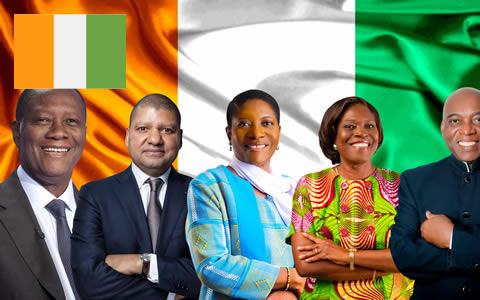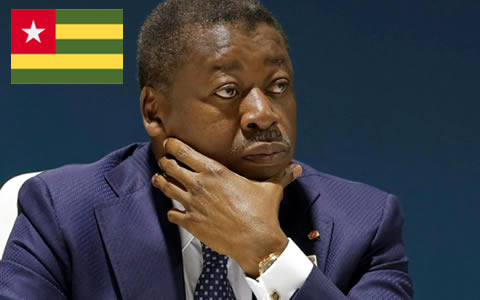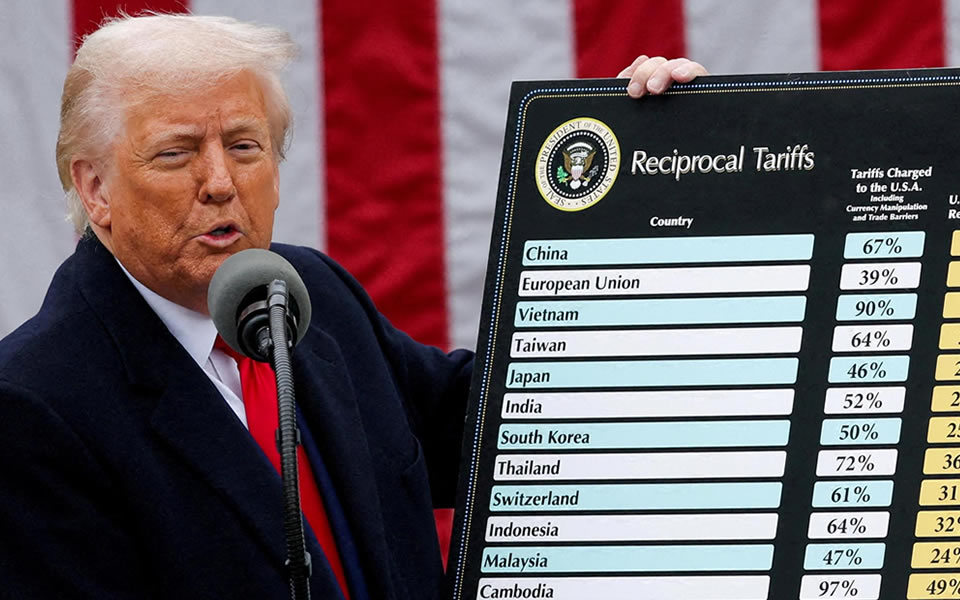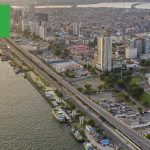
Nigeria: Country Risk Outlook for Businesses in 2024 Q2-Q4
April 26, 2024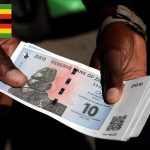
ZiG: Zimbabwe’s New Gold-Backed Currency
May 16, 2024SENEGAL: CHALLENGES AHEAD FOR PRESIDENT DIOMAYE FAYE
Analysts: Samuele Minelli Zuffa
Senior Editor: Magdalena Breyer
What You Should Know
- Sall’s Presidential Extension Bid: Former President Macky Sall expressed his desire to remain in power toward the end of his second presidential mandate. He considered seeking an unconstitutional third mandate, attempting to postpone the 2024 presidential elections.
- Sall’s Oppositional Suppression: The last months of Sall's rule were marked by repression of the opposition’s demonstration, arbitrary arrests, media censorship, and instrumentalisation of the justice system.
- Election Aftermath: The presidential election took place on March 24, 2024, after the constitutional council overturned the election postponement. The elections were fairly and transparently conducted, leading to the uncontested victory of Sall’s primary opponent, the PASTEF’s candidate Bassirou Diomaye Faye.
- Campaign Promises: During the presidential campaign, Faye and now Prime Minister, Ousmane Sonko, emphasised four campaign promises: reforming or withdrawing from the CFA franc, renegotiating extractive contracts for a fairer profit distribution, revising fishing agreements with international partners, and substantially reforming Senegalese political institutions.
- Implementation Hurdles: The lack of a legislative majority, potential disagreements between Faye and Sonko, and the possible spillover of violence from Mali will likely be the main political challenges in implementing Faye’s programme. Senegal’s structural fragilities, including the lack of economic diversification and import reliance on fossil fuel and rice, will likely significantly hinder Senegal’s economy and maintain its vulnerability to external shocks.
The Election
On March 25, 2024, Bassirou Diomaye Faye was elected President of Senegal with 54.28% of the vote, following months of instability due to Sall’s efforts to maintain power. Faye's election, marked by significant victories in Dakar and key regions like Thiès, Louga, Diourbel, Kaolack, and Kaffrine, signifies a major departure from the liberal policies of his predecessor. This shift reflects a broader disenchantment with Sall's administration, evident from the substantial growth of PASTEF's support, which increased 3.5 times over the past five years, particularly beyond Casamance. The economic struggles, prolonged efforts by Sall to hold onto power, and severe crackdowns on opposition likely weakened his coalition, Benno Bokk Yaakaar (United in Hope), significantly aiding Faye's landslide victory against Amadou Ba. All 19 contenders recognized Faye's win, with international partners signaling a readiness to strengthen ties with Senegal.
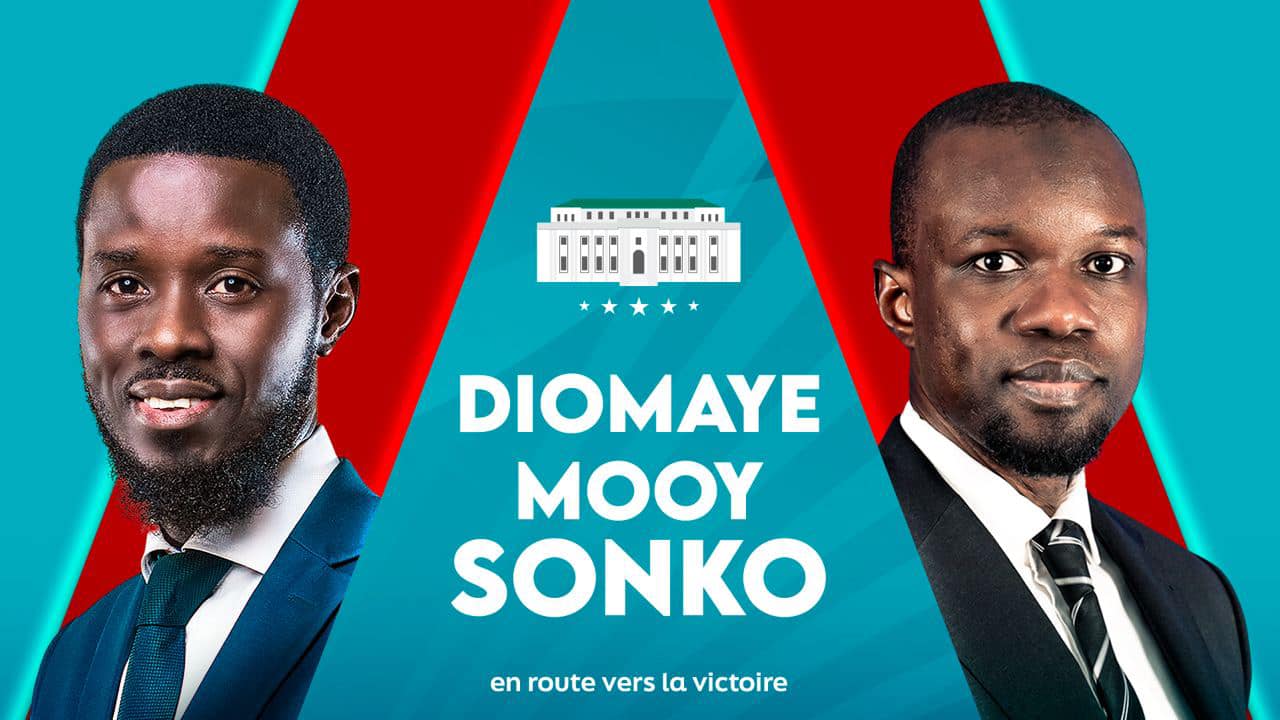
pro-Faye Electoral Poster for 2024 Presidential Elections. The caption in Wolof and French states:"Diomaye is Sonko, on the road to victory"
For over two decades, Macky Sall was a central figure in Senegal’s politics, founding his party after breaking away from the Senegalese Democratic Party (PDS) when former leader Abdoulaye Wade sought a controversial third presidential term in 2012. Educated in Dakar and Paris, Sall maintained close ties with Western powers, continuing the economic and political strategies of previous administrations. Sonko and Faye’s calls for a "rupture" from these policies resonated deeply with the lower classes and marginalised communities, particularly in Casamance, fueling PASTEF’s rise and setting the stage for the significant electoral shift. This political transition is underscored by the active engagement of PASTEF’s supporters, who have been pivotal in challenging the status quo through frequent and intense urban demonstrations over the last three years. As Faye initiates his presidency, he faces significant challenges in realising his progressive, pan-African agenda amid high public expectations for systemic change.
Timeline of Key Political Events in Senegal
May 2023
Sonko launched the defiance caravan from Ziguinchor to Dakar on May 26, protesting against Sall’s power overreach. Two days later, the security forces violently interrupted the march in Kolda and escorted Sonko to his house in Dakar.June 2023
Sonko was sentenced to two years in prison for “youth corruption”. His supporters denounced the sentence as politically motivated and initiated demonstrations in Dakar and Zuiguinchor, with 23 protestors dying in clashes.July 2023
Security forces arrested Sonko on July 28 and officially dissolved PASTEF after Sall announced that he would run for a third presidential term. Sonko started a hunger strike, and demonstrations broke out in Ziguinchor, causing the death of two protestors.November 2023
PASTEF appointed Faye as the presidential candidate, given Sonko’s ineligibility.Early February 2024
The National Assembly postponed the presidential elections by six months to December 2024, extending Sall’s mandate. Opposition parties and associations condemned the “institutional coup” and organised mass demonstrations. Security forces violently repressed the protests, arresting 250 people and killing three.Late February 2024
The Constitutional Court overturned the election postponement on February 15, setting the election date to March 24, 2024. The government released several PASTEF members, including Sonko and FayeMarch 24, 2024
Faye wins the presidential elections at the first turn, obtaining 54.28% of the popular vote.
Background: Socio-Political and Economic Challenges Pre-Election
In the lead-up to the presidential elections, Senegal experienced heightened political instability as incumbent President Sall sought to extend his term by repressing the opposition. Over the last two years, Sall curtailed press freedoms by prosecuting journalists and suspending operations of media outlets such as WALF TV. He leveraged the judiciary to disqualify key political rivals from the 2022 legislative and 2024 presidential elections and suspended vital services like the Dakar-Ziguinchor ferry to penalise regions supporting the opposition. To counter civilian dissent, he banned and violently suppressed adversarial demonstrations, arbitrarily arresting hundreds of citizens and oppositional political leaders.
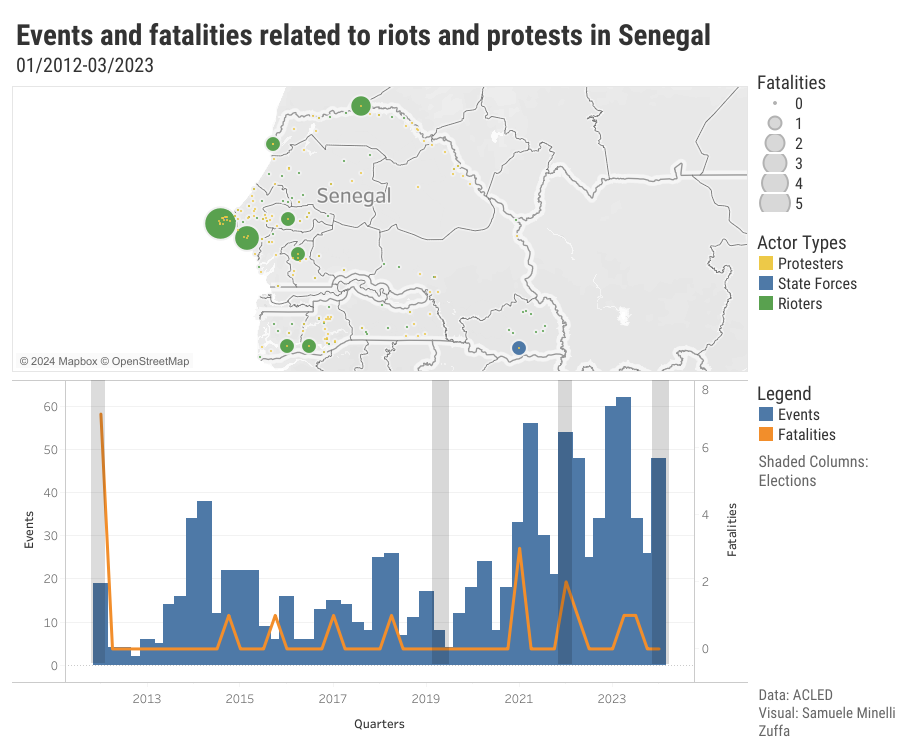
Economically, despite a slight increase in GDP from 3.7% in 2022 to 3.8% in 2023, overall economic growth has decelerated. Inflation consistently rose from April 2021, peaking at 14% in Q4 2022, with food inflation surpassing 20% during the same period. Although inflation briefly declined in 2023, the Consumer Price Index spiked again by May, surpassing previous levels with a 5.3% increase by August compared to the previous year. This economic trend significantly eroded purchasing power, disproportionately affecting the middle and lower classes. Unemployment, which had been above 20% in recent years, decreasing slightly before starting to rise again in Q3 2023, reaching 19.5%. The economy’s limited diversification and its negative trade balance, exacerbated by an oil import-export imbalance resulting in a $2 billion deficit in 2023, highlight its vulnerability to external economic shocks.
President Diomaye Faye’s Political Stance and Campaign Promises
Political Ideology
PASTEF selected Faye as Sonko’s successor due to his strong commitment to the party's political stance, marked by leftist pan-Africanism and economic patriotism. PASTEF advocates for improved national wealth redistribution, economic strengthening, and poverty reduction. The party seeks to enhance Senegal's integration within West Africa and the broader continent, proposing to strengthen the legislative and judiciary branches of the Economic Community of Western Africa States (ECOWAS) and increase "decentralized cooperation" with neighbouring states in sociocultural, infrastructural, energy, and economic sectors.
Key Campaign Promises
1. Monetary Reform
Withdraw or reform the Franc CFA, addressing its colonial legacy and the lack of national oversight in monetary policy. PASTEF views this as crucial for funding the national economy, although specific details remain to be clarified.
2. Fishing Industry Agreements
Revise fishing agreements with international partners, particularly the European Union and China, given the industry’s significance. Fish-related products made up 9% of exports in 2023, totaling $530 million USD.
3. Renegotiation of Extractive Contracts
Renegotiate the terms of extractive contracts, particularly given the recent discovery of the 10 million tonne Greater Tortue Ahmeyim offshore gas reserve. PASTEF considers existing agreements to be disadvantageous and seeks a more equitable profit division.
4. Institutional Reform
Reform the institutional framework to reduce the extensive powers of the Republic President and enhance the independence of the legislative and judiciary branches, promoting a more balanced governance structure.
Challenges Ahead
Political Challenges
1. Legislative Majority Issues: PASTEF’s lack of a legislative majority will very likely impede the promised constitutional reform, as passing the revisions requires 60% approval in the National Assembly and success in a national referendum. PASTEF will unlikely obtain legislative approval given that it controls less than 34% of the seats. The party will very likely require the support of other parties to win the referendum, with PDS unlikely to sustain its electoral support for PASTEF due to its liberal standpoint. The executive will likely dissolve the National Assembly or anticipate the legislative elections (Art 105 of the Constitution) to gain more seats in the legislative branch and support the presidential agenda.
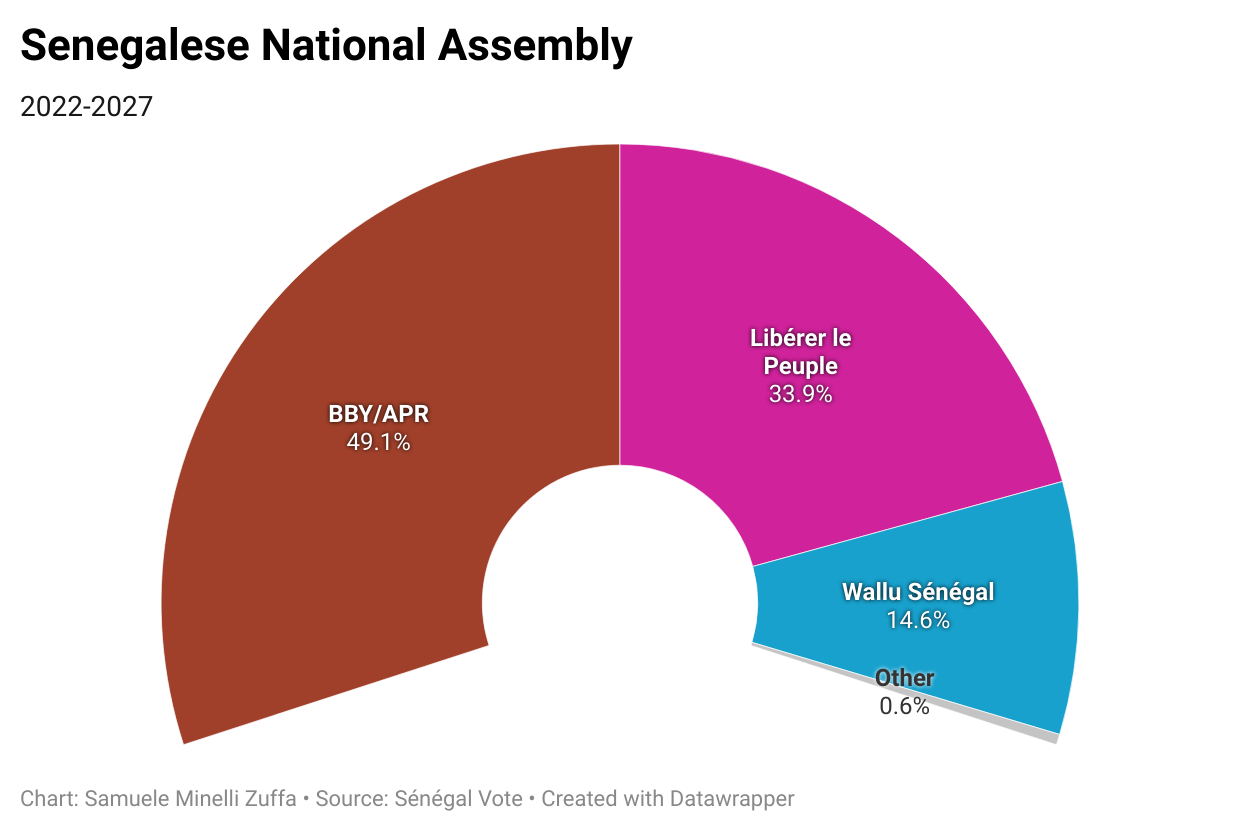
2. Political Coalition Cohesion: The dynamic between the Sonko and Faye will possibly challenge the executive unity in Senegal’s semi-presidential system, where the prime minister’s authority largely depends on the powers the president delegates (art. 50 of the Constitution). Transitioning from being Sonko’s substitute during the presidential elections to a superior official role, Faye will likely need to navigate a complex relationship with Sonko, who holds greater popularity. This dynamic will likely lead to internal conflict if disagreements between the two leaders arise.
3. Insecurity Spillover from Mali: Since January 2023, Jama'a Nusrat ul-Islam wa al-Muslimin (جماعة نصرة الإسلام والمسلمين; JNIM) has progressively expanded its activities in Kayes, significantly contributing to the doubling of fatalities and accounting for 48.5% of violent events registered (January 2023-March 2024). Rising insecurity will very likely negatively affect Faye’s pan-Africanist projects such as the joint construction with Mali of the Kidira Oil terminal.
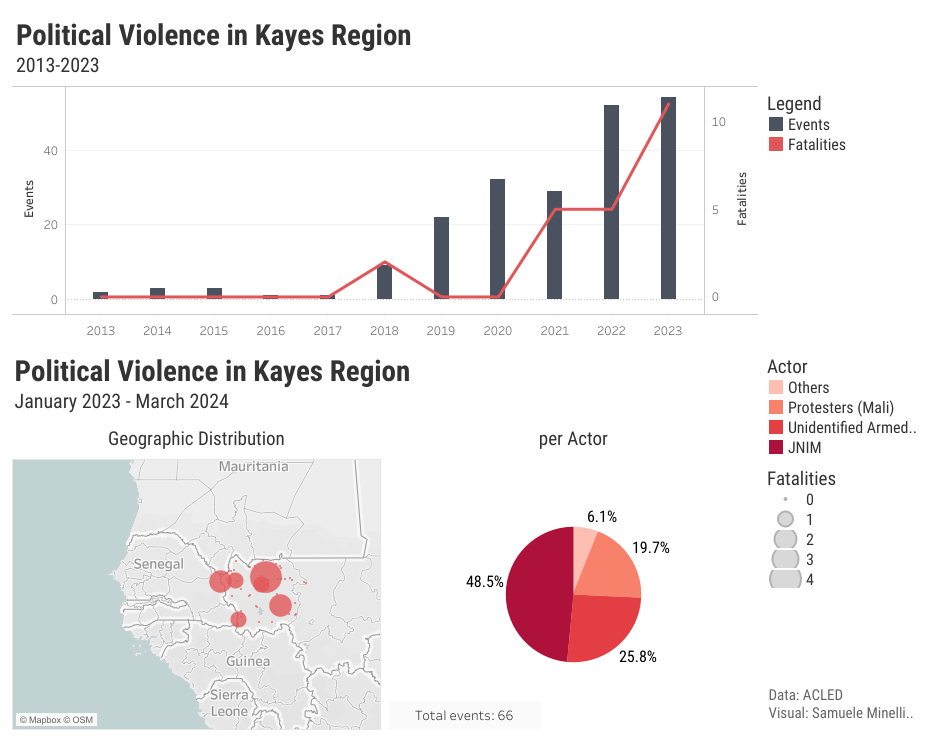
Economic Challenges
- Primary Sector Vulnerability: The primary sector, which employs about half of the active population and contributes approximately 17% to the GDP, is highly susceptible to external shocks such as droughts and locust swarms. The rising frequency of these adverse events, combined with technological deficiencies and inadequate adaptation techniques, will likely jeopardise the economic and food security of millions of citizens.
- Dependency on Imports: Senegal’s heavy reliance on imports such as refined petroleum and rice is likely to result in broader economic repercussions due to fluctuations in international oil prices. These alterations will very likely affect all other economic sectors dependent on oil consumption, negatively impacting both international and domestic food production and transportation.
- Prevalence of the Informal Economy: The predominance of the informal sector, accounting for more than 60% of the GDP in 2024, will likely leave millions of Senegalese in precarious working and life conditions, reducing state revenues.
- Investments and Fossil Fuel Discoveries: Transforming the extractive profits into development opportunities will likely be a key political and economic challenge. The executive will likely face difficulties renegotiating the extractive contracts without discouraging international investors. Faye’s economic position directly contrasts decades of liberal policies and seems unlikely to reconcile with corporate interests. Building national refinement hubs and improving road and energy infrastructures will likely reduce the country’s fragility from external shocks, simultaneously rendering the country more appealing to foreign investors and creating job opportunities.
- Implications of CFA Departure: The CFA franc maintains a fixed exchange rate with the Euro and CFA franc states need to deposit half of their monetary reserves in the French treasury, limiting monetary autonomy. The departure process will likely take several years, necessitating consensus among the eight countries of the Western African Economic and Monetary Union (WAEMU). A unilateral withdrawal from the monetary community will very likely lead to adverse economic consequences due to established economic ties with other West African and European countries. Such a move will likely bring Senegal closer to the Alliance of Sahel States.

